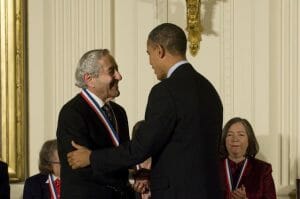“There is no more complex piece of matter in the universe than the human brain, and so the complexity is a huge challenge,” Mishkin said in 2011. And he should know: he studied how the brain worked for more than 60 years. A neuropsychologist, Dr. Mishkin was Chief of the National Institute of Mental Health’s Section on Cognitive Neuroscience in Bethesda, Md., and acting Chief of its Laboratory of Neuropsychology. NIMH is one of the 27 divisions of the National Institutes of Health. Its mission is “to transform the understanding and treatment of mental illnesses through basic and clinical research, paving the way for prevention, recovery, and cure.” He worked at the NIMH for his entire career.

What explains Miskin’s longevity in his field? “Perseverance is built into the trait of curiosity, a scientist’s motivation,” he said. “If you’re sufficiently curious, you’re willing to continue despite failures, despite obstacles. It’s so easy to give up. There may be no more than half a dozen discoveries in a researcher’s lifetime.” Besides: “I don’t know how a scientist could think of retiring early. For the sheer enjoyment of the process, we stick to it for as long as we possibly can.” OK, but isn’t neuropsychology — a blend of neuroscience and psychology — a weird combination? “The marriage between psychology and neurobiology is not complete, but each arm recognizes how desperately it needs the other,” he explained. “Neuroscience at an integrative level can’t be pursued unless we know something about the organization of the mind and the organization of behavior. Psychology can’t get very far without trying to understand how the nervous system gives rise to such organization.”
“Studying the brain is both horribly and wonderfully complicated,” Mishkin once said. “It’s so frustrating it takes such a long time to figure out even a few of the thousands of circuits, but every discovery is a fantastic high.” Specifically, Mishkin studied the pathways for vision, hearing, and touch, and how those streams of information are encoded into memory. “Each brain area is important for a different kind of behavioral or mental function,” Mishkin said. “Every area is part of a circuit. So we’ve been identifying pathways and trying to figure out how they work.” Mishkin discovered that the brain processes memories in two separate systems: cognitive memory (dealing with events and fresh information), and behavioral memory (related to skills and habits). “Our work has helped to account for the memory losses people with Alzheimer’s Disease suffer from,” he said — which provided clues for how to design treatments. In 2009, Mishkin was awarded the National Medal of Science for Behavioral and Social Science, presented by President Barack Obama. He retired from NIMH in 2016 — at 90 — and returned the next year as a scientist emeritus. “Mort” Mishkin died at his Bethesda home on October 2, at 94.
